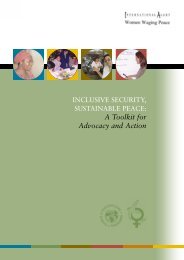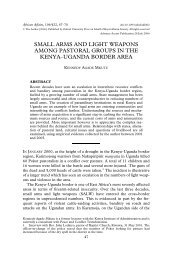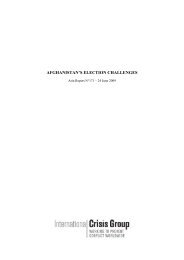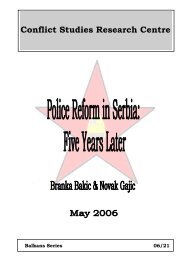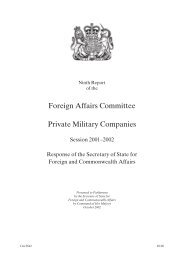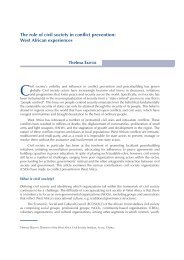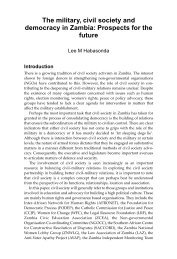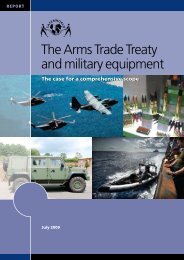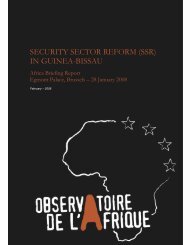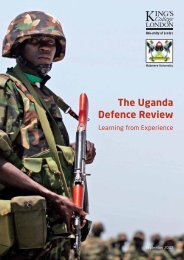promoting security sector reform in fragile states - GFN-SSR
promoting security sector reform in fragile states - GFN-SSR
promoting security sector reform in fragile states - GFN-SSR
You also want an ePaper? Increase the reach of your titles
YUMPU automatically turns print PDFs into web optimized ePapers that Google loves.
the broad spectrum of <strong>SSR</strong> and development<br />
needs <strong>in</strong> the country. This can be<br />
assisted through an assessment—such<br />
as a national <strong>security</strong> system review—of<br />
the country’s <strong>security</strong> needs and context<br />
for <strong>reform</strong>, carried out by, or <strong>in</strong> collaboration<br />
with, relevant local actors.<br />
Take whole-of-government approaches<br />
to <strong>SSR</strong> and consider mak<strong>in</strong>g necessary<br />
<strong>in</strong>stitutional changes<br />
In establish<strong>in</strong>g development and <strong>security</strong><br />
policy as <strong>in</strong>tegrated areas of public<br />
action through overarch<strong>in</strong>g approaches<br />
to <strong>SSR</strong> and democratic governance,<br />
DAC donors, work<strong>in</strong>g with<strong>in</strong> their<br />
governments and organisations and with<br />
the <strong>in</strong>ternational community, should:<br />
2. Improve policy coherence by tak<strong>in</strong>g<br />
a whole-of-government approach<br />
to <strong>SSR</strong>: foster <strong>in</strong>term<strong>in</strong>isterial dialogue,<br />
implement <strong>in</strong>stitutional change,<br />
and ma<strong>in</strong>stream <strong>security</strong> as a public<br />
policy and governance issue <strong>in</strong> donor<br />
and partner country governments. The<br />
absence of a whole-of-government<br />
approach may mean that actions by<br />
government departments compound<br />
rather than mitigate <strong>security</strong> problems.<br />
Ma<strong>in</strong>stream<strong>in</strong>g the <strong>SSR</strong> concept across<br />
the whole-of-government is also important<br />
<strong>in</strong> view of the <strong>in</strong>creased emphasis<br />
on counter-terrorism <strong>in</strong> some OECD<br />
<strong>security</strong> assistance programmes. (The<br />
DAC has issued a policy statement and<br />
reference paper, A Development Co-operation<br />
Lens on Terrorism Prevention:<br />
Key Entry Po<strong>in</strong>ts for Action (2003), on<br />
issues relat<strong>in</strong>g to terrorism and development.)<br />
The DAC has also recently<br />
clarified def<strong>in</strong>itions of what counts as<br />
ODA <strong>in</strong> a manner that takes account of<br />
the need to safeguard the <strong>in</strong>tegrity and<br />
credibility of DAC statistics. Whole-ofgovernment<br />
approaches would facilitate<br />
the provision of needed assistance that<br />
would comb<strong>in</strong>e f<strong>in</strong>anc<strong>in</strong>g from ODA<br />
and other relevant budget sources.<br />
3. Develop greater co-ord<strong>in</strong>ation,<br />
harmonisation and an effective division<br />
of labour among development<br />
and other actors work<strong>in</strong>g <strong>in</strong> a partner<br />
country. Effective donor support to<br />
exist<strong>in</strong>g mechanisms at the country level<br />
is essential. It is particularly important<br />
given the vary<strong>in</strong>g legal limitations and<br />
operational capacities of development<br />
agencies to work across the range of<br />
<strong>security</strong> system <strong>reform</strong>s. In divid<strong>in</strong>g<br />
responsibilities, each actor should be<br />
able to pursue its comparative advantage<br />
without underm<strong>in</strong><strong>in</strong>g the common<br />
effort.<br />
4. Recognise the role that OECD<br />
governments should play <strong>in</strong> address<strong>in</strong>g<br />
<strong>security</strong>-related issues such as:<br />
<strong>in</strong>ternational corruption; money launder<strong>in</strong>g;<br />
organised crime; perpetuation<br />
of militia-l<strong>in</strong>ked private <strong>security</strong> forces,<br />
<strong>in</strong>clud<strong>in</strong>g through support from mult<strong>in</strong>ational<br />
enterprises; human traffick<strong>in</strong>g;<br />
the proliferation of weapons of mass<br />
destruction; terrorism prevention; and<br />
illicit trade <strong>in</strong> small arms, light weapons.<br />
Facilitate partner countryowned<br />
and led <strong>reform</strong> efforts<br />
Experience shows that <strong>reform</strong> processes<br />
will not succeed <strong>in</strong> the absence of commitment<br />
and ownership on the part of<br />
those undertak<strong>in</strong>g <strong>reform</strong>s. Assistance<br />
should be designed to support partner<br />
governments and stakeholders as they<br />
move down a path of <strong>reform</strong>, rather<br />
than determ<strong>in</strong><strong>in</strong>g that path and lead<strong>in</strong>g<br />
them down it.<br />
A major problem <strong>in</strong> the area of <strong>security</strong><br />
system <strong>reform</strong> <strong>in</strong> some regions, particularly<br />
<strong>in</strong> Africa, has been a lack of local<br />
<strong>in</strong>put to and ownership of the emerg<strong>in</strong>g<br />
<strong>reform</strong> agenda. This issue is most<br />
significant <strong>in</strong> “difficult partnership”<br />
countries.<br />
DAC donors are committed to facilitat<strong>in</strong>g<br />
partner country-owned and led<br />
<strong>reform</strong> through efforts to:<br />
5. Recognise that needs, priorities and<br />
circumstances govern<strong>in</strong>g <strong>SSR</strong> differ<br />
substantially by country. Magnitudes,<br />
objectives, perceptions and approaches<br />
vary greatly. A country specific approach<br />
is important. Flexibility <strong>in</strong> donor<br />
policy frameworks and programm<strong>in</strong>g<br />
is therefore essential. This should be<br />
underp<strong>in</strong>ned by the understand<strong>in</strong>g and<br />
analysis of differ<strong>in</strong>g capacities, will<strong>in</strong>gness<br />
and ownership to embrace <strong>SSR</strong>.<br />
6. Provide assistance <strong>in</strong> ways that enhance<br />
domestic ownership of <strong>reform</strong><br />
processes and strengthen <strong>in</strong>stitutional<br />
frameworks and human capacity for<br />
manag<strong>in</strong>g the <strong>security</strong> system <strong>in</strong> a manner<br />
consistent with sound democratic<br />
governance practices and transparent<br />
f<strong>in</strong>ancial governance. Help to create<br />
local demand and vision for change by<br />
support<strong>in</strong>g activities that help:<br />
• Increase dialogue among the <strong>security</strong><br />
forces, actors <strong>in</strong> the wider <strong>security</strong><br />
system, civil society organisations<br />
such as women’s groups and ethnic<br />
m<strong>in</strong>ority groups and the general<br />
public and br<strong>in</strong>g an appropriate mix<br />
of expertise.<br />
PROMOTING SECURITY SECTOR REFORM IN FRAGILE STATES 27






